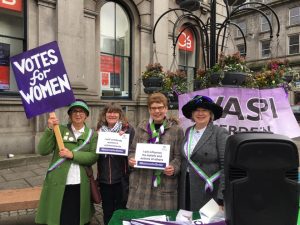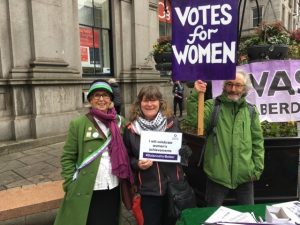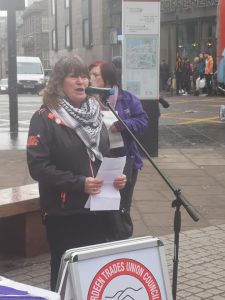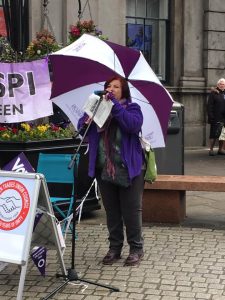
Branch delegates to the Aberdeen Trades Union Council, Kate Ramsden, Morag Lawrence and Steve Gray all attended a very successful event to celebrate International Women’s Day on Saturday 7th March.
Branch pensions champion and magazine editor, Morag was one of three UNISON members who organised the event. It began with a stall in St Nicholas Square, along with the WASPI women who are still calling for transitional measures to protect women whose state pension age was moved from 60 to anything between 63 and 66.
Passers by stopped to find out more and to offer support.

A number of speakers, all women, then spoke of women’s achievements, the challenges ahead and how, standing side by side with each other, we can tackle these for the generations to come.
Branch co-chair, Kate Ramsden, spoke on behalf of UNISON, a union whose membership is three quarters women, many of them in low paid roles.

“Fifty years on from the Equal Pay Act the gender pay gap is still with us,” slammed Kate pointing to the fact that it is mainly because most of the jobs that women do are just not valued.
“Yet they are amongst the most important roles in our society – roles we just couldn’t do without.
“Carers who look after our older people, our children and those with disabilities, bringing them dignity and promoting their independence.
“Pupil support staff, supporting our most vulnerable children to get the most from their education.
“Pre-fives workers, preparing our children for education and supporting good parenting.

“Cleaners, keeping our schools and hospitals clean and hygienic and catering staff making sure that our children and vulnerable adults get healthy and nutritious food.
“Roles that are fundamental to a caring and civilised society, yet are not valued and are amongst the poorest paid jobs.
“If we are ever to achieve equal pay that needs to change. We need to value women more and we need to value what we all do.”
Kate condemned the last ten years of austerity, describing it as a mass transfer of wealth to the richest from the rest of us. It has impacted on us all but has hit women hardest, as citizens and as workers.
“And if you are a disabled woman, a Black woman, an LGBT+ woman or a young woman then the impact will have been even greater. Because we are not all in this together!”
“Now don’t get me wrong. This affects men as well as women and we need to stand together against austerity and this massively increasing inequality in our society.
“But yet again women are over-represented amongst the poorest groups, as parents, carers and workers.”
However, added Kate, there is some good news. Women are beginning to stand together and are fighting back.
She pointed to the equal pay strike in Glasgow as evidence of the power of the collective. Women in solidarity and sisterhood, and supported by men, winning that fight to be paid for the years of underpayment compared to men doing work of the same value.
And home carers in Dundee, coming together to challenge changes to their terms and conditions.
“They won their strike ballot and the council backed down.
“Other women across the country taking action to prevent outsourcing of their services. Winning strike ballots and winning the argument – often without taking any action.
“Standing together not just for themselves, but for the services they provide and the people they provide them to and building confidence in their power as a sisterhood to create change.”
Kate called on women to use International Women Day to energise us for the fight ahead – “a fight for equality not just for ourselves but for our daughters and also for our sons.
“To remind ourselves that when we stand together we can challenge discrimination of all sorts. And when we believe in ourselves we can win.”
